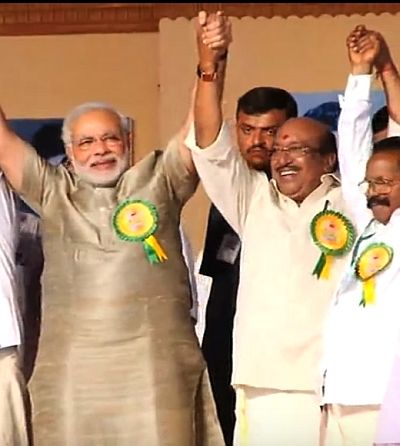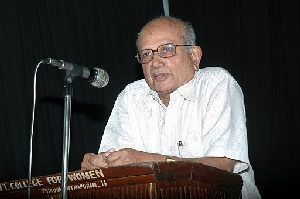
'Unlike in other states, minorities form a significant number in Kerala. They have money and political power.'
'In such a society, the emergence of a new communal power is not a healthy thing.'
B R P Bhaskar, 83, is one of the most respected journalists in Kerala. He started his career at The Hindu and went on work with The Statesman, Patriot, Deccan Herald, before he became the consultant editor of the Asianet television channel when it was launched in 1994.
Bhaskar, below, left, discussed with Shobha Warrier/Rediff.com the political changes expected in Kerala, which will go to the polls in a few months' time.
When I spoke to Vellapally Natesan, he said the kind of influence Christians and Muslims have in decision-making in Kerala was the reason behind him trying for Hindu unity.
That's his opinion. His slogan was to unite all Hindus from the Namboothiris to the Nayadis. But with the Nairs staying out, there is a big dent in his idea of Hindu consolidation.
The Namboothiris may be small in number, but certainly they have social clout because of their past domination. There was division among the Namboothiris too about joining hands with Vellapally.
The Ezhavas and Nairs form the major chunk of Hindus in Kerala.
And if you look at the total population of Kerala, Hindus will come only just above 50 per cent.
The problem the Hindus have is the political clout the Christians and Muslims have in Kerala through the Muslim League, the Kerala Congress and even the Congress itself.
There is a feeling that Christians are able to wield more political influence even in the Congress. This feeling is not new.
A K Antony himself said there was a feeling among the Hindus that the minorities were ruling the roost.
Prominent personalities from the Nair community like former ISRO chairman Madhavan Nair, actor Suresh Gopi, etc openly said they were all for Hindu unity.
But the Nair Service Society president is adamant about not being part of such a unified Hindu community. Will he get the support of the Nairs of Kerala?
There is a group within the NSS that is opposing the NSS president and there is a group in the SNDP (the Sree Narayana Dharma Paripalana Yogam) that is opposing Vellapally.
But political parties fear Vellapally as they think he will take away votes.
R Sankar was a much greater leader and a powerful person in politics than Vellapally, but in the old Travancore state, a stronghold of the SNDP, Sankar, who was president of the Congress and secretary of the SNDP, could not win in any of the constituencies he contested.
Finally, he went to Kannur to get elected to the assembly and became the chief minister.
Do you think Vellapally can garner the support of the majority of Ezhavas?
Certainly not. The capacity of the SNDP to influence Ezhava voters is extremely limited.
If you take the (2015) local body elections, the BJP (Bharatiya Janata Party) got more votes, and who has suffered? It's not the LDF (Left Democratic Front) that had the support of the majority of Ezhavas that suffered, but the UDF.
If you look at Yogendra Yadav's study of the last assembly elections in Kerala, it says 65 per cent of the Ezhavas voted for the Left. It is a fact that a majority of the community have been voting for the Left for several years.
 You are saying only the UDF will get affected and not the Left.
You are saying only the UDF will get affected and not the Left.
If the efforts of Vellapally have borne some fruit and the BJP achieved some acceptance in Kerala in the local body elections, it has happened at the expense of the Congress.
The Ezhava elements who are with the Congress may be more vulnerable and get influenced by Vellapally and the BJP than the Ezhavas who are with the Left.
Vellapally is talking about a Third Front with the BJP. Is there space for a Third Front in Kerala?
From 1980, political parties other than the BJP have been fighting either as part of the UDF or LDF and never alone. In the assembly also, only the UDF or LDF has won. There was no third party or front coming into the assembly.
Today, the BJP's voting strength has increased. With the present voting strength, it is possible for a third party or a front to come to the assembly. They need not have a very big number.
In the last assembly election, the difference between the UDF and LDF was marginal. There was no BJP or any third element then. Now that the third element has grown, they are in a position to win two or three seats.
In the 140-member assembly, imagine three are from the BJP. Suppose the number is equally divided between the UDF and the LEDF, even with 2 or 3 members, the BJP may be able to hold the balance between the two fronts.
These three fellows can decide who will rule Kerala. That will be Vellapally's real game!
So, you feel Vellapally is going to be the kingmaker.
He himself says so. He said he would decide who would rule Kerala next.
Do you think both the UDF and LDF have failed Kerala and that was why the BJP could influence voters?
That is the general impression. That is why both the fronts are in a very bad shape. I would say both the fronts are on the verge of collapse and people have a feeling that there is not much difference between the two.
They are losing ground and they are not able to understand this situation.
Now parties have become election machineries. In five years, three are election years; assembly, Lok Sabha and local body elections. It means they are constantly in election mode.
The highly commented programmes of Kerala are welfare-oriented programmes and they are all election programmes.
Do you feel youngsters are moving towards the BJP as the two fronts have not been able to do anything for the young?
There is no such indication so far, but one thing is clear: Kerala is getting urbanised at a very fast pace. So the thinking changes.
Why did youngsters move to other places for jobs? Because there were no jobs available here. They may be sending money, Rs 1 lakh crore a year, but they are all effectively social or economic refugees.
Then, people want to go with the winning side and with the BJP having won at the Centre, its ability to attract votes is much greater.
The BJP and Vellapally are talking about development. Will it work with the young?
Other than creating some slogans, what development has taken place in the last two years?
For the last few years, both the fronts in Kerala are also using the development slogan, but the development that is taking place in Kerala is the wrong kind of development.
When the Gadgil Committee gave a report on the Western Ghats, all the political parries united to destroy it. In the name of development, the environment is being destroyed.
Assembly elections are a few months away. What kind of changes do you see happening in Kerala?
I am of the view that both the fronts may suffer. But I am concerned that what is taking its place is not an improvement.
The BJP-led Third Front can be the kingmakers and they will demand a price for that. What that price is, what impact will it have is a worrying factor.
Unlike in other states, minorities form a significant number here in Kerala. They have money power and political power.
In such a society, the emergence of a new communal power is not a healthy thing.
As a political observer, how do you look at Vellapally Natesan's efforts to unite the Hindus of Kerala as a political force?
This is not the first time that such an effort is being made to consolidate the Hindu political wing.
Mannath Padmanabhan and R Sankar, the two leaders of the prominent caste organisations, the Nair Service Society and the SNDP Yogam that speaks on behalf of the Ezhava community, made an effort way back in the 1950s and 1960s to bring all together under the Hindu Maha Mandalam.
The motivating factor was the general feeling among the political class that the Congress was getting controlled by the Christians. But the effort did not succeed.
Why didn't it succeed?
There are inherent contradictions between the position of the Nair community and the Ezhava community. The Nairs enjoyed certain benefits under the old caste system. Naturally they wanted to preserve that.
So whatever efforts they made were short lived. Later, when K Karunakaran was chief minister, the NSS and SNDP started sponsoring their own political parties because as caste organisations, they could not be on the political scene.
In fact, in 1947 at the time of Independence, the NSS and SNDP Yogam declared that they were withdrawing from the political field.
So, during Karunakaran's time, the NSS created the National Democratic Party and the SNDP Yogam created the Social Republican Party. Both became allies of the UDF (United Democratic Front) at one time. They were in the Karunakaran ministry also. But this also didn't last too long.
Has the political atmosphere changed in anyway today?
The inherent contradictions remain. A few years ago, when Vellapally became the SNDP leader, he and the NSS secretary made an attempt, but that too did not bear fruit. Vellapally could not bring all under a Hindu umbrella.
I don't think Hindu consolidation is going to work in Kerala. It is very difficult to create a common Hindu identity because of the differences between the so-called upper castes and the lower castes.










